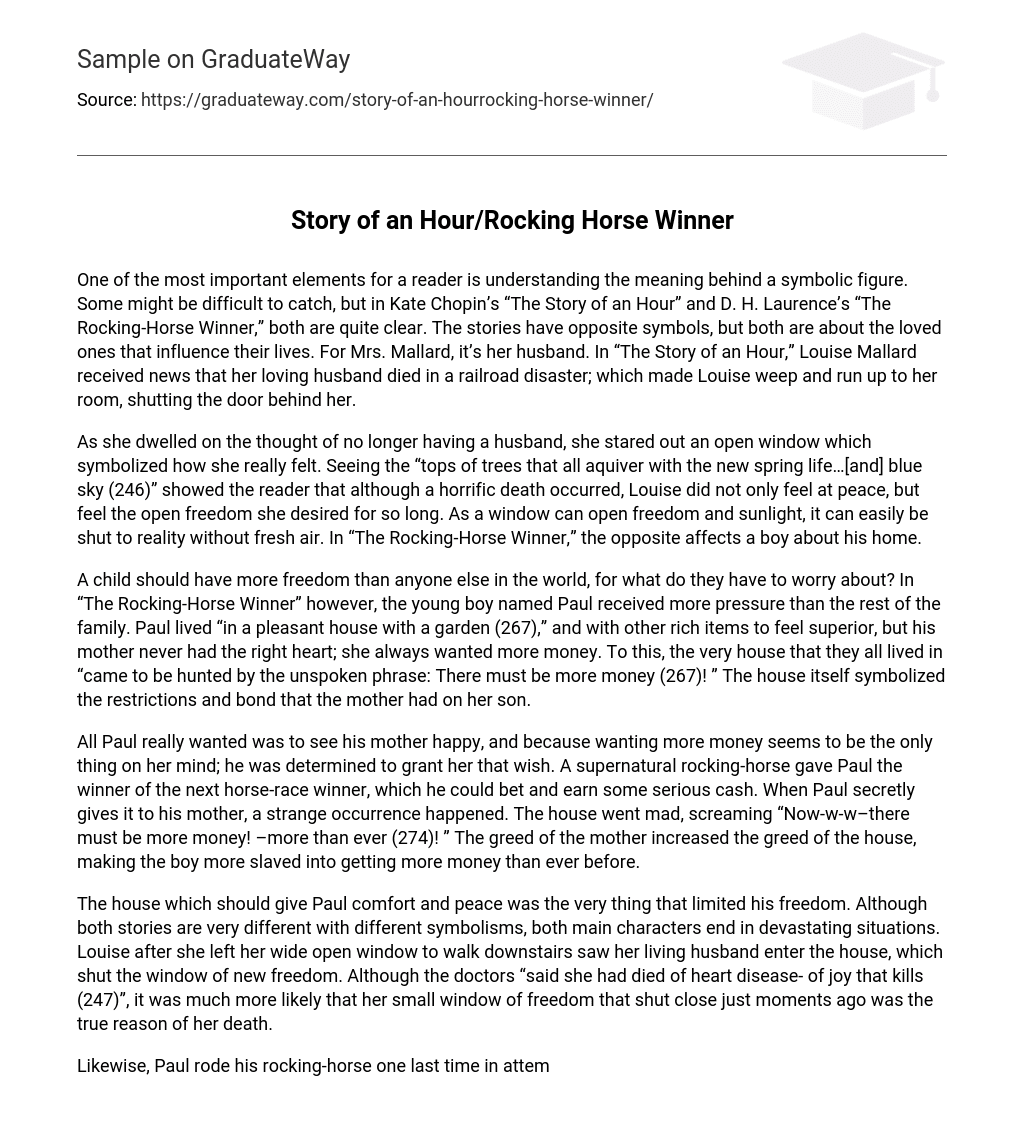Understanding the meaning behind a symbolic figure is crucial for readers. In Kate Chopin’s “The Story of an Hour” and D. H. Laurence’s “The Rocking-Horse Winner,” this understanding is evident. Although the stories have opposite symbols, they both revolve around the impact of loved ones on their lives. In the case of Mrs. Mallard, her husband holds significant importance. In “The Story of an Hour,” Louise Mallard learns of her husband’s death in a railroad accident, which leads her to cry and hide in her room by shutting the door.
While contemplating the absence of her husband, she gazed out of an open window, symbolizing her true emotions. Observing the “trembling tops of trees and the vibrant blue sky” (246), it becomes evident that despite the tragedy that took place, Louise not only experienced tranquility but also the liberation she had yearned for. Just as a window can grant access to freedom and sunlight, it can equally close off reality and fresh air. Conversely, in “The Rocking-Horse Winner,” a young boy undergoes contrasting effects concerning his home.
A child should have more freedom than anyone else in the world, as they have no worries. However, in “The Rocking-Horse Winner,” Paul, a young boy, experienced more pressure than the rest of his family. Despite living in a pleasant house with a garden and other luxurious items that made him feel superior (267), his mother was always unsatisfied with their financial situation. As a result, the house they lived in became haunted by the unspoken desire for more money (267). The house itself represented the constraints and control that the mother exerted over her son.
All Paul wanted was for his mother to be happy, but all she seemed to think about was wanting more money. He was determined to fulfill her desire. Then, a supernatural rocking-horse revealed the winner of the next horse race to Paul. This gave him an opportunity to bet and earn a significant amount of money. Paul secretly shared this knowledge with his mother, and something strange happened. The house went into a frenzy, screaming “Now-w-w–there must be more money! –more than ever (274)!” The mother’s greed amplified the house’s greed, causing the boy to become even more desperate to acquire more money than ever before.
The house, intended to bring Paul comfort and peace, ironically limited his freedom. Despite their divergent narratives and symbolism, both main characters meet tragic fates. Louise, upon descending the stairs after leaving her wide-open window, witnesses her living husband entering the house, thus abruptly closing the window to her newfound freedom. The doctors may claim that she died of joy-induced heart disease (247), but it seems more plausible that her recent loss of freedom, as her small window slammed shut, was the actual catalyst for her demise.
Similarly, Paul made a final attempt to silence the talking house and satisfy his mother by riding his rocking-horse. In doing so, he experienced convulsions and fell to the ground, screaming the name of the next winning racehorse. After placing a bet on that horse and, naturally, winning, Paul tragically died that night (277). Through carefully placed symbols, the authors successfully conveyed the intended meaning of the stories. Both Louise and Paul were able to free themselves from the enslavement of loved ones and life itself. However, it is the ones they left behind who must endure suffering.





